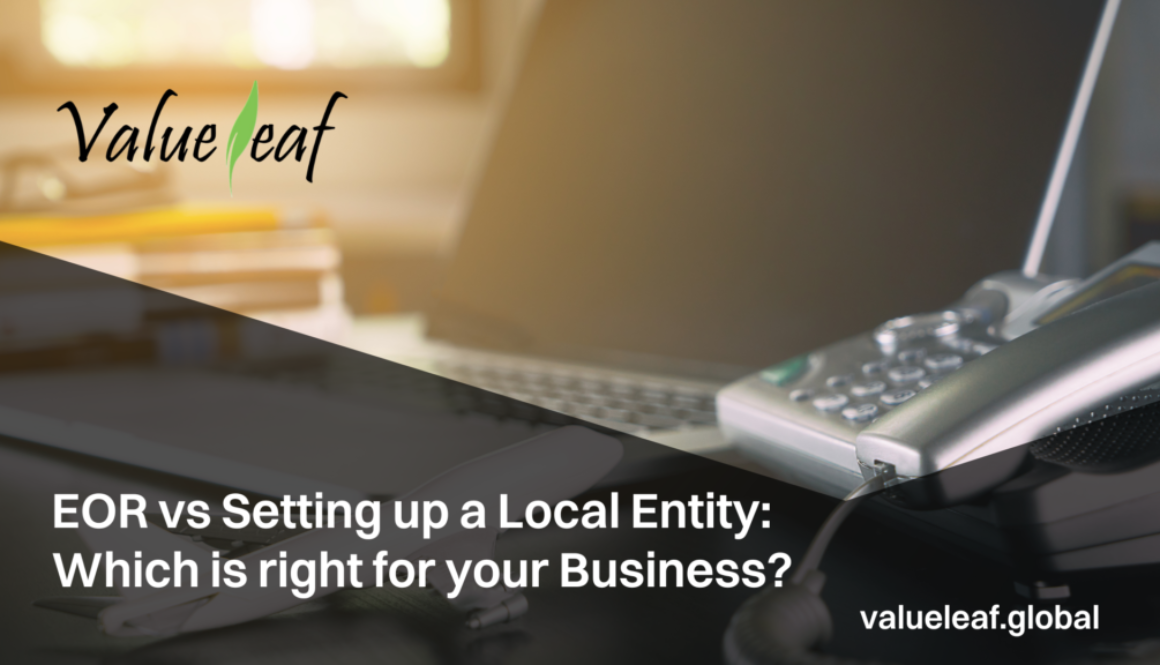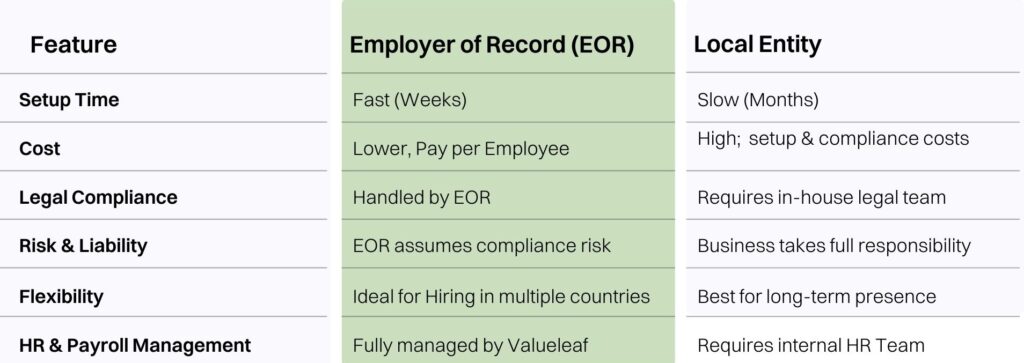How to expand your Business Globally without setting up an office
Global Expansion: The New Business Imperative
Expanding business Globally used to mean large capital investments, legal registrations, office spaces, and a long list of logistical headaches. But today, companies are growing beyond borders faster than ever—without the need for physical offices.
The rise of remote work, digital hiring solutions, and Employer of Record (EOR) services has transformed how businesses scale globally. Whether you’re a startup testing a new market, an e-commerce brand targeting global customers, or a tech firm looking for skilled talent—there’s a smarter way to expand.
In this blog, we’ll explore how businesses can successfully enter international markets, hire employees, and operate seamlessly—without setting up a physical presence.
Why Businesses are ditching Traditional Expansion Models?
Historically, companies had to establish a local entity, lease office space, and hire an in- house team to expand into a new country.
🔹 High Costs – Office rentals, legal fees, compliance costs, and staff hiring create a massive financial burden.
🔹 Slow Market Entry – Registering an entity, obtaining work permits, and setting up payroll can take 6–12 months—slowing down growth.
🔹 Complex Compliance Issues – Each country has different labor laws, tax regulations, and employment rules that require local expertise.
🔹 Uncertain ROI – Investing in a new market without knowing whether it will be profitable is risky. Many companies hesitate to take the leap.
But businesses today have better options—ones that allow them to test markets, hire employees, and build a global presence efficiently without the need for local offices or registrations.
5 Ways for a Global Expansion Plan, without setting up an Office
1. Hire Global Talent Through an Employer of Record (EOR):
One of the biggest challenges of international expansion is hiring employees without a local entity. This is where an Employer of Record (EOR) helps. An EOR enables companies to legally hire employees in any country without setting up an office or business entity.
EOR:
✔ Acts as the legal employer while the business manages daily operations
✔ Handles payroll, taxes, benefits, and compliance in each country
✔ Ensures full legal protection while hiring global employees
✔ Speeds up hiring—onboarding employees in weeks, not months
Example:
A U.S.-based SaaS company wants to hire a software engineer in Germany but doesn’t want to register a German entity. Using an EOR, they can onboard the employee legally in just a few weeks—without worrying about German labor laws or payroll taxes.
✅ Key Benefit: Companies can access Global Talent quickly and legally—without entity setup or office space.
2. Establish a Remote-First Business Model:
Not all businesses require physical offices to operate in a new market. Companies can build international teams, collaborate effectively, and serve global clients using remote work solutions.
🔹 Use Virtual Collaboration Tools – Platforms like Slack, Zoom, Notion, and Trello allow teams to communicate and work seamlessly.
🔹 Leverage Cloud-Based Operations – Store data, manage projects, and automate workflows using cloud services like AWS, Google Workspace, and Microsoft 365.
🔹 Hire Remote Customer Support & Sales Teams – Instead of setting up local branches, businesses can hire remote sales, support, and marketing teams to engage with customers in different regions.
🔹 Adopt a Global Payroll & Benefits Solution – Partnering with an EOR ensures that remote employees get paid accurately, on time, and in compliance with local laws— without the need for a physical presence.
✅ Key Benefit: Companies can reduce overhead costs, improve workforce flexibility, and operate globally without expensive infrastructure.
3. Leverage Digital Marketplaces & E-Commerce Platforms:
Expanding internationally doesn’t require a physical presence when businesses can sell products and services online. Companies can:
✔ Use global e-commerce platforms like Shopify, Amazon, or eBay to reach customers in multiple countries.
✔ Set up localised websites with region-specific currencies, payment gateways, and shipping options.
✔ Optimise for cross-border digital marketing, using Google Ads, LinkedIn, and social media targeting.
✔ Partner with local fulfilment center’s to handle inventory and shipping.
Example:
A UK-based fashion brand wants to expand into Australia. Instead of opening a local store, they launch an Australian Shopify site, integrate local shipping providers, and use digital marketing to reach customers—all without a physical office.
✅ Key Benefit: Businesses can scale their products and services globally without a local presence.
4. Partner with Local Distributors & Resellers:
For businesses selling physical products or services, strategic partnerships can eliminate the need for setting up a full office.
🔹 Work with Local Distributors – Partnering with established distributors helps businesses enter new markets without logistical complexity.
🔹 Leverage White-Label & Reseller Agreements – Many companies sell their products through resellers who handle marketing, sales, and local compliance.
🔹 Use Professional Employer Organizations (PEOs) for Sales Teams – Businesses can hire local sales representatives through an EOR to drive market growth without setting up an entity.
Example:
A European software company expanding into Japan partners with a local IT distributor who resells their product—allowing them to enter the market without opening an office.
✅ Key Benefit: Companies can establish a presence in new markets through trusted local partnerships—without heavy investment.
5. Optimise for Local Compliance without physical presence:
Compliance is one of the biggest hurdles in global expansion. But businesses can stay legally compliant without setting up an office by:
✔ Using an EOR for hiring and payroll compliance
✔ Working with legal advisors specialising in international regulations
✔ Automating global tax and invoicing processes through cloud-based solutions
✔ Ensuring data protection compliance (GDPR, CCPA, etc.) without a local legal entity
Example:
A U.S.-based consulting firm wins a client in Singapore but has no local office. They use an EOR to employ local consultants while keeping full legal and tax compliance—without setting up an entity.
✅ Key Benefit: Businesses can expand confidently while staying compliant—without physical offices or legal registrations.
Smart Global Expansion without borders
The world is more connected than ever, and businesses no longer need a physical presence to scale internationally. Whether you’re hiring employees, selling products, or entering new markets, strategies like:
✔ Employer of Record (EOR) solutions
✔ Remote-first operations
✔ E-commerce & digital expansion
✔ Strategic local partnerships
✔ Compliance automation
Are few of the strategies allow companies to expand quickly, cost-effectively, and without unnecessary risks.









